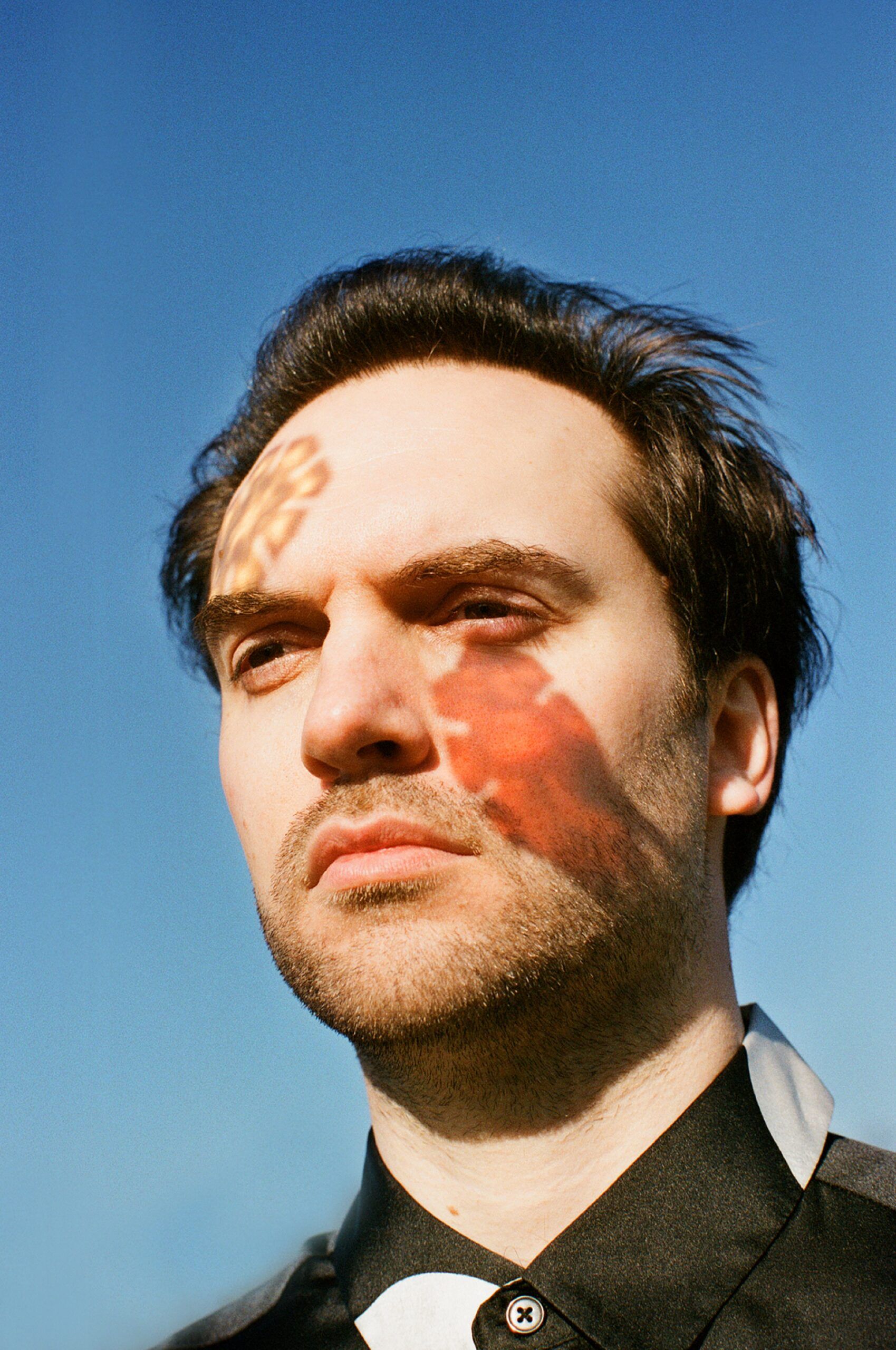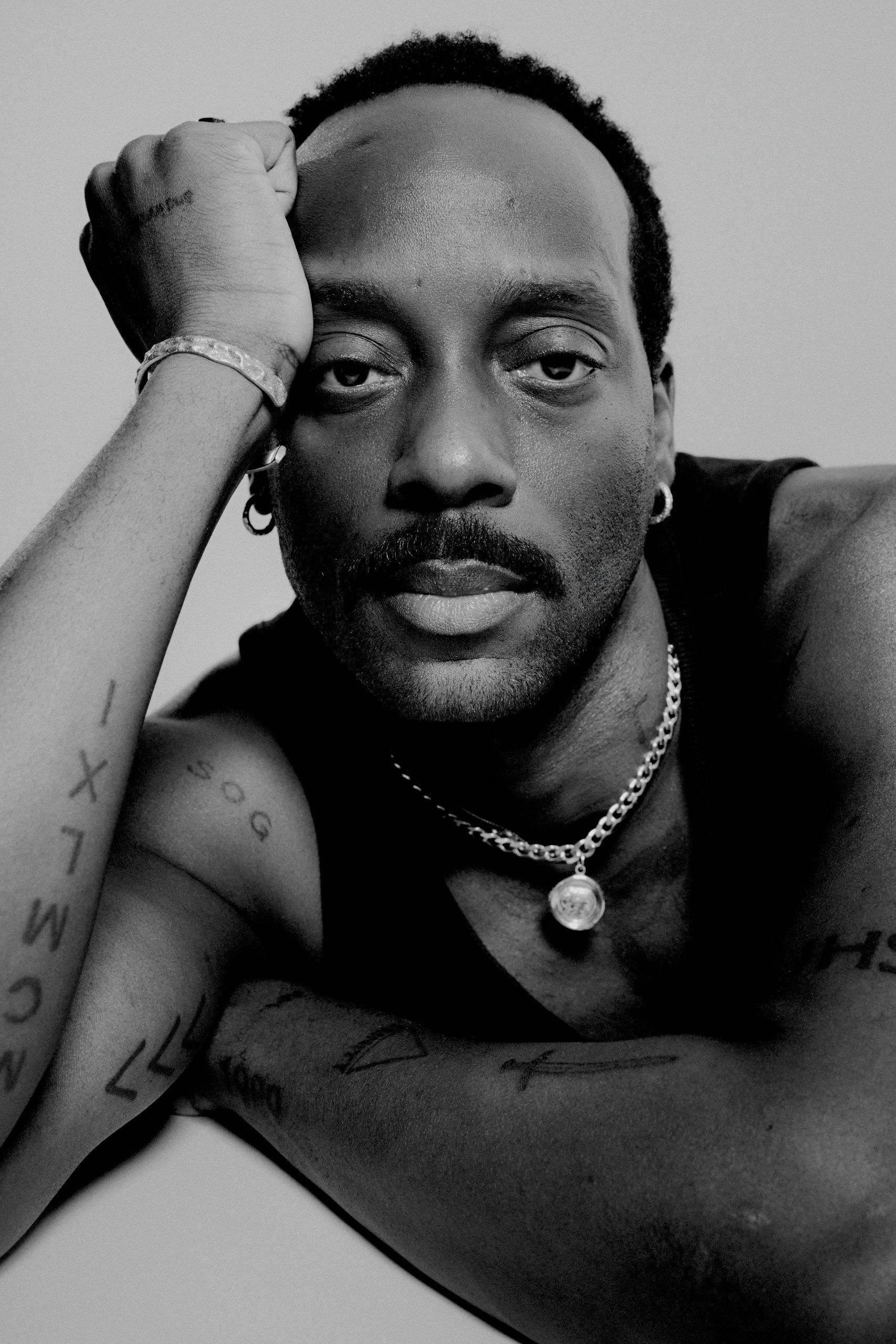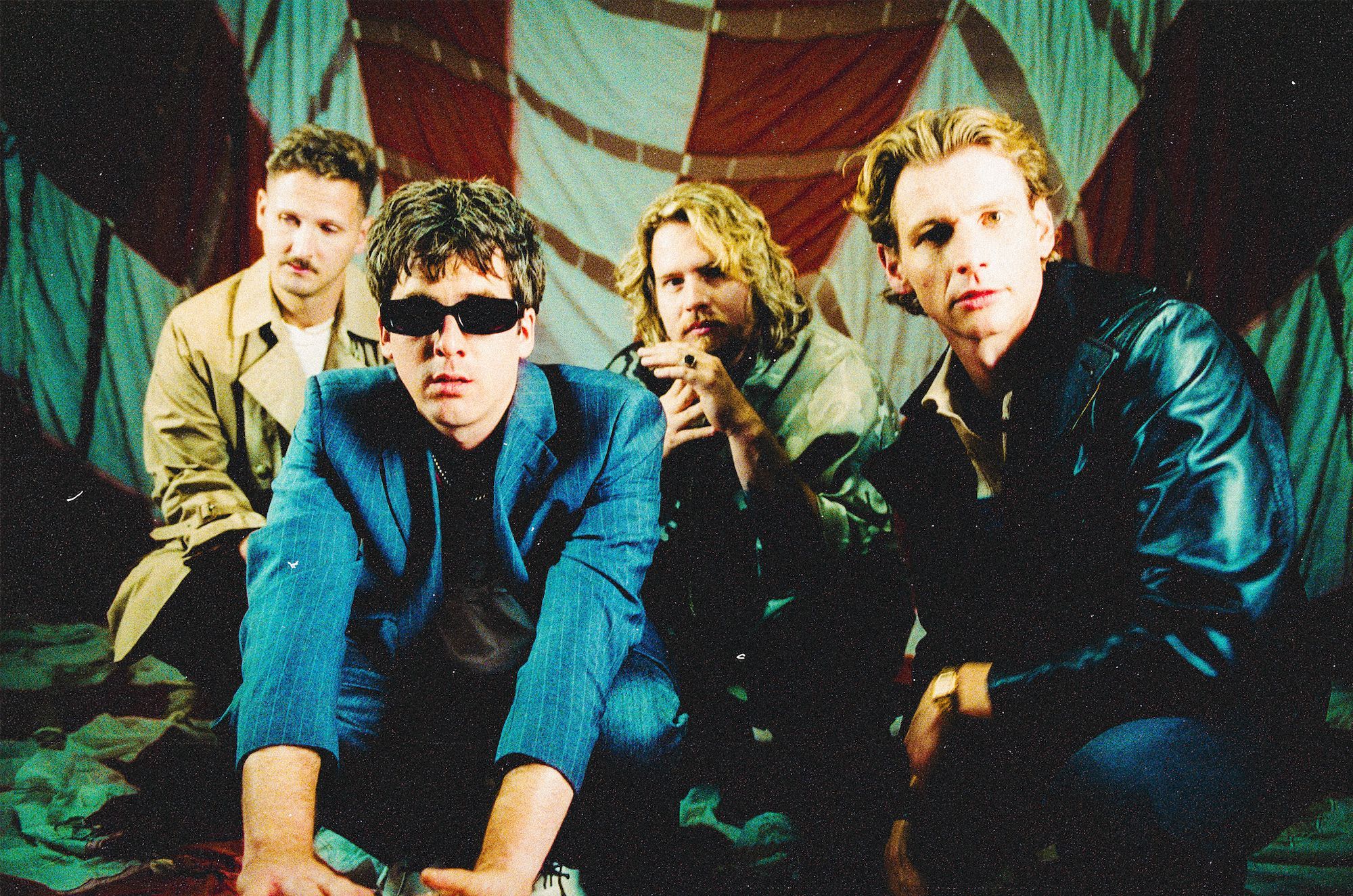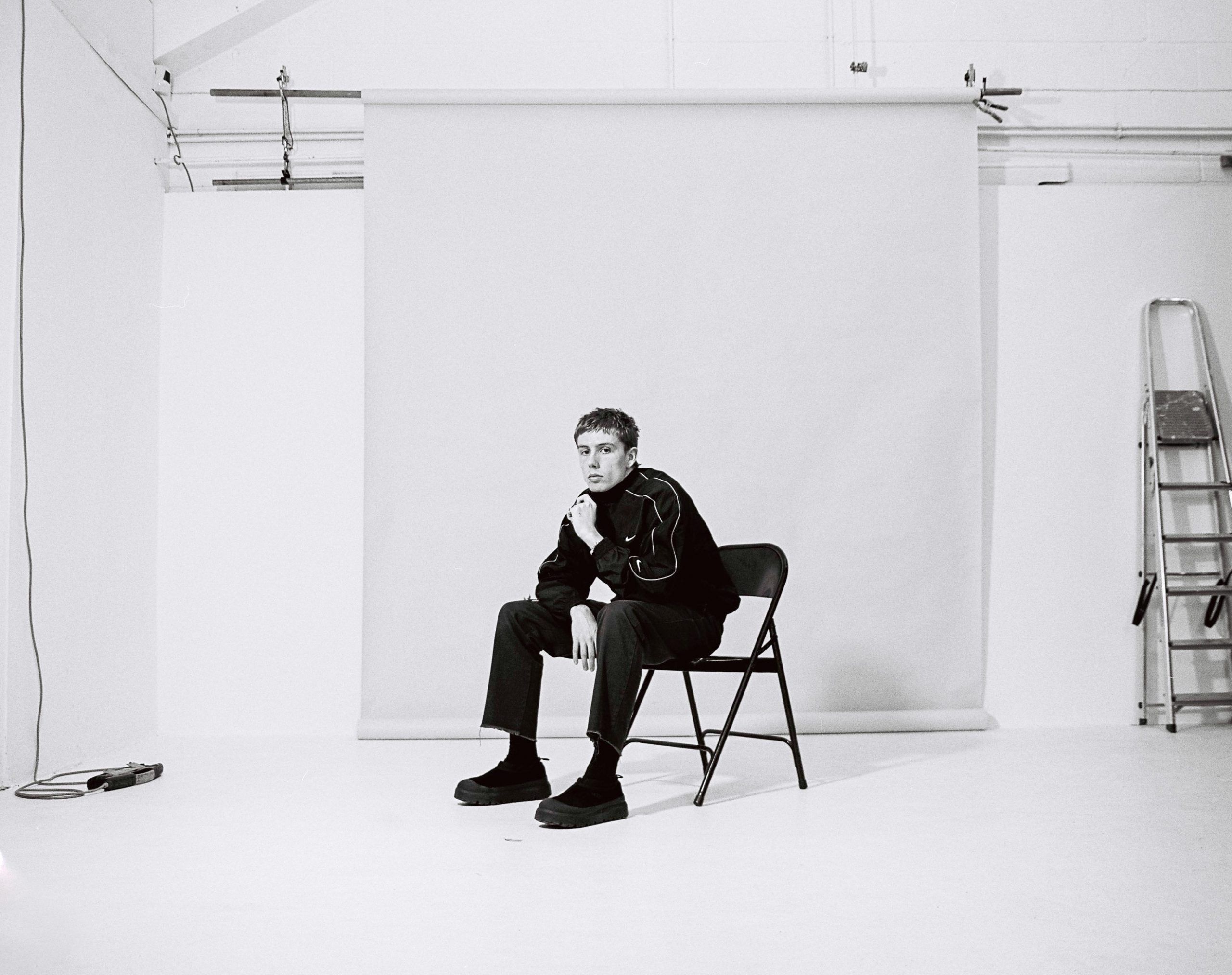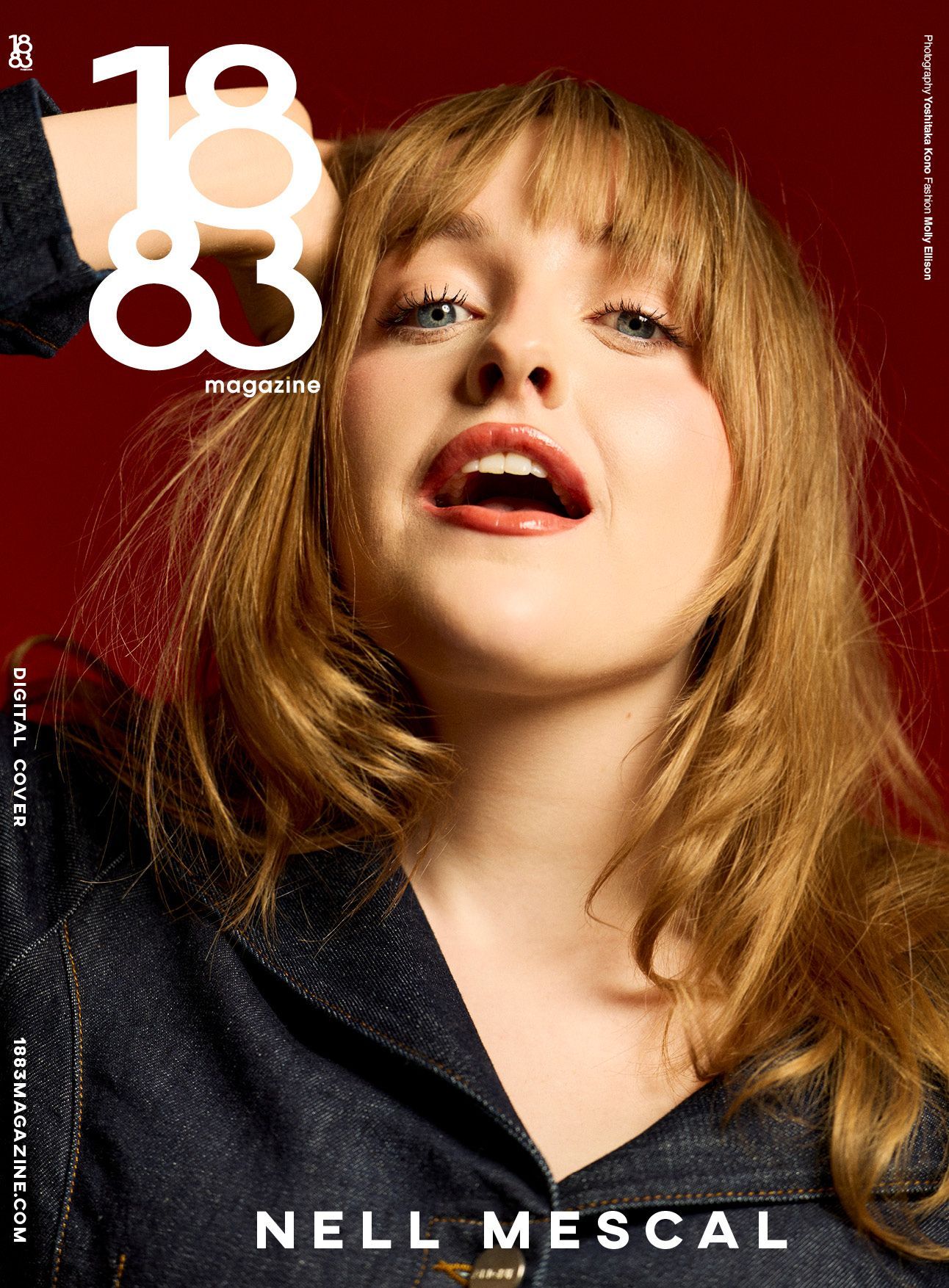Sam Eastgate AKA LA Priest has built up a solid reputation for penning versatile, intricate, and distinctively unique songs.
Eastgate is a songwriter that I would personally call ‘a musician’s musician’. Since growing up with a love for music, the Wales-based artist has been in several different bands and collaborations over the years and has experimented with numerous different styles and genres. His first guitar-based band Late Of The Pier were an active mid-2000s dance-punk band that signed to Parlophone Records. Alongside this, he’s also even collaborated with New Zealand’s avant-garde artist Connan Mockasin in a project called Soft Hair. Having spent years learning and refining his craft, his musical knowledge, curiosity for exploring musically, and technical prowess is unmatched. These are just some of the traits and skills Eastgate brings to his latest musical project, LA Priest. Impressively, when it comes to the LA Priest moniker, Sam writes, produces, and even makes entire drum machines and other pieces of kit for the solo venture. Back in 2015, Sam released LA Priest’s debut record Inji and when he released the 2020 follow-up entitled GENE, the creative even built a modular drum machine using 150 electrical circuits he had made himself. Both albums delve into layered electronic sonics thanks to his creations that inspire his work.
His newest LA Priest album Fase Luna, which dropped at the start of May via Domino Records, is an interesting body of work that materialised after a botched trip to Belize. After the release of his sophomore record GENE, Eastgate was receiving a huge amount of interest from buyers across the globe that wanted to purchase a handbuilt drum machine from the gifted musician, one of those requests was from a client in Belize, so Eastgate and his family decided to pack up their bags and relocate to the area for the job but because of lockdown restrictions at the time, they weren’t allowed to enter the country. So instead, they settled in Mexico and Costa Rica. During this period, Eastgate enjoyed the tropical locations and set out to work on Fase Luna. As a result of having only the tools he had with him and inspired by the change of scenery, Fase Luna is an album that is far more stripped back, guitar-driven, and full of off-kilter-indie-pop tunes. It’s a warm and delightful project and Eastgate’s songwriting will easily transport you to the costa rica jungles he inhabited at the time.
In conversation with 1883 Magazine’s Cameron Poole, Sam Eastgate discusses his latest album Fase Luna, balancing work and pleasure in a tropical paradise, and how he’d like to help people get out of the house more.
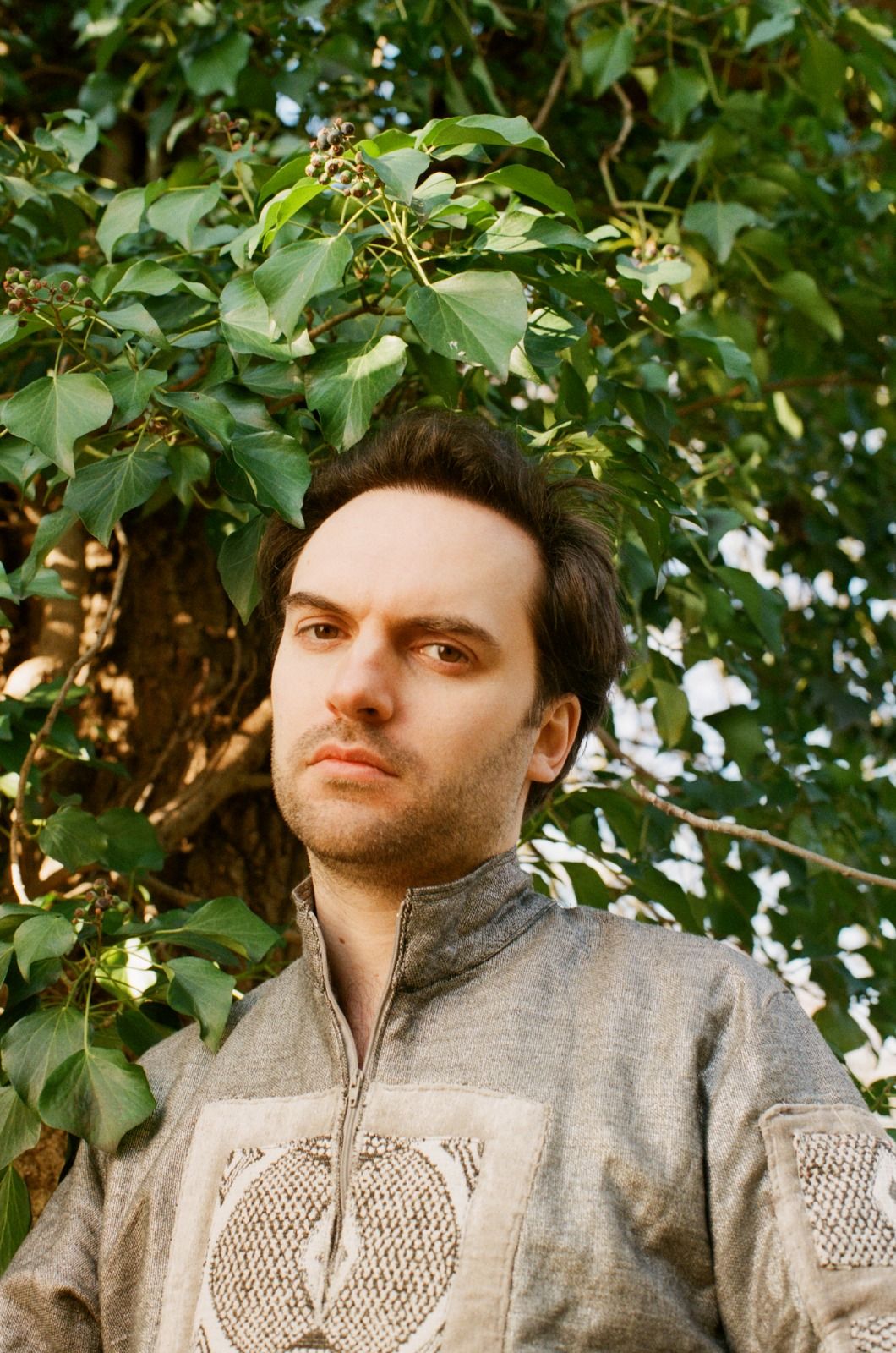
Hi Sam, congratulations on releasing your new album Fase Luna. To start, would you mind please telling us what you learnt about yourself as an artist from writing this album?
Oh, wow. I suppose I learnt a lot about what I can do with the guitar as a solo instrument because I’ve never approached an album in this way before. I mean I did start off with a few little electronic instruments, synths and things, and they just seemed to be the kind of misfit bits of the record, and they are few and far between compared to the other instruments on there. Eventually, it just sounded like the guitar was going to be the sound of everything on the record, which is quite mad because there’s just one guitar that I used, it’s just got a bass string on it, it’s a bass. I don’t know if that’s very introspective but to be honest I don’t get to really know more about myself so much until a lot later on. I think when I’ve made a record, it often takes a couple of years before I can really stand back from it, and then I learn a bit more about myself. Right now, it’s still maybe too recent. But I would say I just sort of learnt to use different ways to do things with a guitar, that is the big takeaway from making the album.
Given you were in different surroundings from what you are used to when making music, And as you were in a tropical paradise, how did you find balancing work and pleasure?
Yeah. I think that was actually one of the big themes of the record really. I was in a position where, which I have been in the past, where now I’m my own boss, so to speak, so I don’t have any time that is solely for work or downtime specifically, which can be detrimental sometimes. When you can’t find what you’re looking for, or you have this laser focus on a sound or a song that you’re trying to work on, then you just end up burning yourself out sometimes as you’re constantly working. Even when you do try and impose time off from it, you’re not really there. Your brain is still working around the clock. I remember there was one point, and it’s usually before I get over the hump or middle section of making the record, once you get over that, you start to feel like there’s enough momentum to carry you through and finish the record. But just before I got to that point for this record, I remember I was only getting a few hours of sleep a night because I would just be working.
My brain is just always working on songs, all night, even when I’m asleep. This is the first album where I mixed it myself, and some nights my brain has played a trick on itself where it thinks I’m actually busy mixing a track but I’m actually supposed to be sleeping. So I’m lying in bed not mixing a song, but I think I am. One thing I found really helpful with that is just to stay enjoying the music. Get to a point where it is work, if you can but once you stop enjoying it, stop. Whenever I got to that stage, I’d realise this is not going to be productive in any way because I’m just not enjoying it. Everything changes when you just say to yourself: “if I’m not enjoying it, then I’m not going to do it.”
Because you do what you are most passionate about in life as your career, I can imagine it becomes a twenty-four-hour job as you just love working on it so much…
Yeah, and that’s the truth of it. I think it could be misinterpreted as saying, ‘It’s important to enjoy your work all the time’ but actually it’s just important to do good work. if you want to be successful at anything, sometimes you have to do stuff that you don’t enjoy. But the unique thing about music, and I suppose other things that are creative, is that enjoying it is actually going to be helpful to the art. It’s going to make everybody else enjoy it more as well. Especially doing things like just recording things fast, that is almost the one rule that I stick to with everything. I don’t really keep to any formulas or use the same techniques, but the one thing that I do try is just to almost finish a song the first day, the first hour even sometimes, that I’m trying to record it. Obviously, I can’t record every idea and stuff like that, but it should sound like a piece of music that I could play to somebody by the end of that little recording session. If you do that, then you just get all of the energy and enthusiasm, and you get none of the confusion and over-thinking.
The artwork for Fase Luna is striking, I know the original photo is from Javier Diaz but could you give us some context about the image? It seems to perfectly encapsulate the themes of the record.
When I got to Puerto Viejo, which is pretty far down south near the border with Panama, we stayed there. It was a location quite nearby some friends that gave us the first nudge really to visit that area. That was the only nudge we needed. I moved into this place in Puerto Viejo , and I didn’t know anything about the owners. It just looked cool in the photos. It just looked like the kind of place where I could just record whilst looking up at trees and things like that. In the cabin we stayed in, there were all these great photos hanging up. Like weird photos of close-ups of people’s arms with a scorpion or something. I thought “Wow, that’s pretty daring photography”, all these poisonous animals on people’s bodies and things like this, and the photos were done in a really good way, and they were very weird out of context landscape shots where you don’t know what you were looking at. I used to be into photography, I was studying it at college before I started skiving off and doing music. So I’m always into photography.
The second day we were there, the owners invited us to have a drink with them and I then met Javier and he straight away showed me his record player. He played 60s prog music and the kind of more untamed side of psychedelic rock. It was the icing on the cake in this mad environment as all the cabins were built by hand and everything materialised as a result of his own passion projects. So yeah, I eventually just started asking about the photos. He had done all of them. So he’s a real legend. For his day job, he’s basically the representative for Costa Rican indigenous tribes. He tries to get them the rights to free and clean drinking water and more. So he’s an all-around legend. He just had this photo on his phone [the Fase Luna Artwork], and it was a really tiny little copy of it. I’ve completely messed with the colours of the photo, they were completely reversed. Originally it looked like a nighttime photo on the original photo. I still don’t know whether it was day or night, which added to the intrigue of it. He just said yeah, this is just some stuff I did in my spare time. Straight away, I knew it was an album cover.. As soon as I saw it, I asked “Can I have it?’” For me, I think what drew me to it is it does seem to really capture that bridge between the animal kingdom and human form. It’s like this weird bridging of those two worlds. It’s like you’ve seen the exact embodiment of a cross-hybrid animal-human thing, and you’ve caught it unaware.
It really does seem that the universe was sort of making this all happen when you were in this tropical paradise, you met Javier and got the album artwork through him, you went on YouTube and had a drumming video suggestion come up where you found a decent local drummer and you ended up meeting with him and he recorded drums for the record.
Yeah. Even just being in that part of the world does make you feel there’s this kind of oneness. I think it’s no wonder that people go out there for a spiritual retreat sort of thing. You only have to meet a few people there, and I don’t know whether it’s just the effects of the sun and the sound of nature all around you, but it feels like everything’s tied together in a meaningful way. But you have to also look at the other side. You have to also have your wits about you because you do start to sink into this feeling of everything being taken care of for you. When you’re in that environment, you feel like you could just sit on a beach and let life happen around you. I suppose there’s nothing wrong with that. But I do think you have to remember what the plan was before you got there.
It’s like a hypnotic feeling which takes you into this dreamland. So yeah, I managed to get stuff done by sort of snapping my fingers now and again and waking myself up. I just had to tell myself to keep making things. I also had to discipline myself to get people together and get things done for the album. Javier was a great example of how you can be productive. There were a lot of people around that I never saw do anything, which is fine, each to their own. But every day Javier would put on his best shirt and go out and meet somebody, like a legal representative for work, and then he’d be going out to these jazz clubs in the city. I just couldn’t believe the energy, considering the climate as well. It’s just inspiring to see that you can live in paradise, as it kind of seems, and also be a machine that gets so much stuff done, you know?
We need to talk about your forthcoming headline tour which starts later this year, it’s going to be pretty special right? It must be crazy to think that you only had one record at the time when you last played a show. I can imagine deciding the setlist is going to be super hard!
Yeah, it’s a great thing to have. It’s such a relief to be playing for the first time and not just have one album’s worth of material. As you can imagine, my only choice was just to play those songs. I really didn’t have much leftover material from that first record. The way I’ve written has changed. I used to really just wait for songs to come around, and sometimes it would be months until a new song just materialised. The first two records were pretty much like that. I tried a little harder with the second one. But with Fase Luna, I would write twenty songs in a day and just see if any of them worked. So that’s why now I’ve actually got even more than the three albums’ worth of material. I’ve actually got all of these other ideas. So really, it’s a totally different problem. The problem now obviously is just how to choose where to go in a live set.
With these two little shows that I did recently, I just did this one little promo event in France. I don’t even know if it was public, it may have just been a TV thing. They didn’t really explain what I was doing, I just played [laughs]. But with that performance, I just played about three songs from each album. I tried to even it out. But it made me think afterwards, that the live set is still just one side. It’s like I picked all of the upbeat songs from my record. It strikes me that I could very easily at least split into two different sorts of shows. I have two very different sets. My go-to thing now is just to pick up a guitar and play the guitar side of every song, really do this guitar-led thing that abandons this whole electronic side of what I do. So there’s that kind of split just to start with, that I could probably do something really good with. I don’t know how you market that though. I don’t know how you even explain: “Listen, do you want to come to my electronic show or my guitar show?” It’s a bit weird.
You could always do an amalgamation of things during a live set, when you’re doing a headline show people are coming to see you, so whether you want to play a load of deep cuts or do something more upbeat, or whatever you want, people will just be happy to see you perform!
I’ve always wanted to do this thing where I move into a slightly different mode. I would sort of finish the set but then I’d be still there kind of like a DJ but not a DJ, or just not so much as a performer. But it’s very hard to show what’s happening. People might think, ‘Well, he’s just not doing anything anymore. He’s just kind of twiddling a few knobs.’ But I always thought it’d be quite good just to keep the entertainment going and maybe just have a sign that says, ‘Yeah, this is me being lazy now,’ [laughs]. People could just dance, turn to their friends, and it’d be great if people wouldn’t just stare at you the whole time. I don’t really think that’s a necessity with live performance, you don’t have to be the centre of attention the whole time. For me, it’s always been just to provide the music for the occasion.
I had the same dilemma even before I started releasing music as LA Priest. I thought I couldn’t do anything except dance music because my first single called Engine, which pre-dates any of my previous bands even, came out in 2007. It was a club dance track and I had a real hard time when it came to doing my first solo stuff because I just thought “Well, that’s how I’m perceived now.” It’s crazy to think about now. I think a lot of artists have to grapple with how to do what they want and really not have any subconscious bias, or conscious, to fulfil other people’s expectations for what they’re actually seen as, identity-wise. It does prevent a lot of artists from just really expressing whatever they want to do. I do like it when artists just have this very definite identity. But for me, I’ve got a short attention span and I don’t really like the same set of songs. I always have a fondness for a lot of my songs, but I don’t necessarily want to play the same songs every day anyway. I think that’s why I’m inching more towards having a band, especially because when you have a band, I think it is a lot easier just to say like ‘Oh, scrap that song. Let’s play this instead.’ You don’t have to reprogram all your equipment.
I think we’re living in a time now where audiences are more accepting of artists changing things musically. You don’t just have to stay in one lane anymore. It would just be boring if an artist kept doing the same thing.
Yeah, I think that’s true as well. I think most people would probably agree that we’re actually fully in this new generation of music listeners now. Not even in terms of their age, it’s just that technological shift we’ve gone through, it’s probably changed a lot of rules. Somebody like me, who most of my career was before that shift, I probably still haven’t fully adjusted to things like you say, like people actually being more forgiving than I would realise. A lot of rules have probably just been thrown out. It’s a great time to be doing what I’m doing because I feel like I’m just going to keep learning new tricks. I can’t really see any sense of reaching a limit, because there are so many things that I’ve wanted to do that I’ve kind of put on hold and put on the shelf. Combine those ideas with all of these new ways of actually releasing music and for people to hear it. Yes for me, it’s just picking something and sticking with it long enough to make it happen, and not getting distracted all the time.
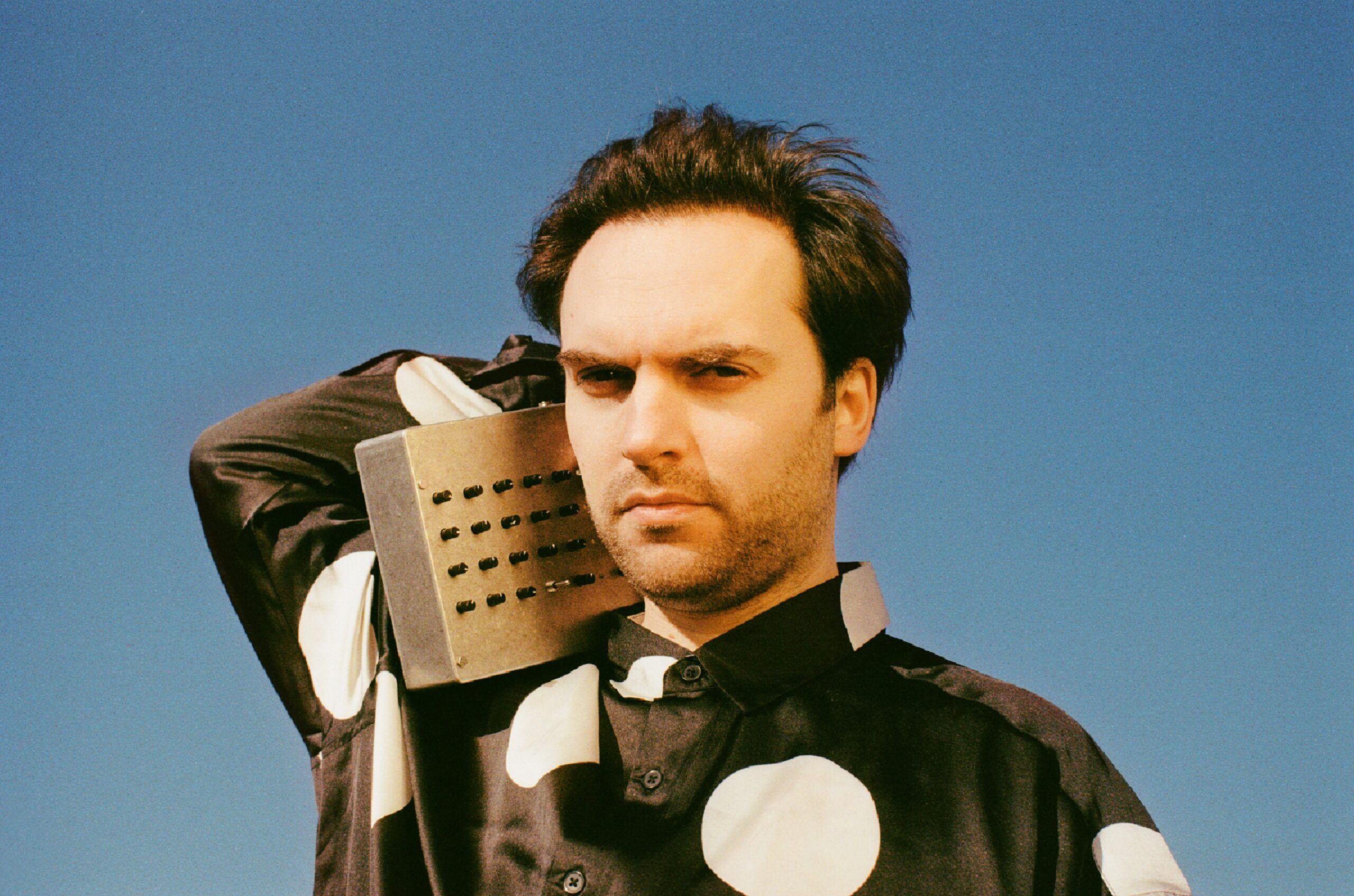
I know for your previous album GENE you built a modular drum machine which you used on the album. Have you made any other pieces of kit that you ended up using for Fase Luna?
I made a new drum machine I used a lot when I was writing the songs for this album. The only reason it didn’t make it on… there is a tiny bit of it actually on the record. I’ll kind of leave it as a sort of Easter egg because I guess people might want to hunt for it and see if they can find it. But there’s a little tiny bit still of the drum machine. It’s like the only electronic sound on the record. I think I can say that. Yeah, so that drum machine had a very different design from any of my previous ones. It just came out with these very unpredictable rhythms that I think you can hear on some songs if there is something unnatural about the rhythm. Sail On, for example, has a bit of a slightly backwards feeling beat to it. That was just something that the drum machine provided.
The only reason a lot of the drum machine elements got taken out was due to the fact that the actual sounds that I was trying to make were really close to an actual real drum sound. It felt like just the natural thing to do. I see all the equipment I make more as writing tools than necessarily as production tools. They don’t have all the bells and whistles for a lot of this production electronic equipment, but they’re really good for writing.
I had homemade pedals, guitar pedals and things. Everything goes through this one pedal that’s always on for me. It’s like a circuit that I copied from an old mixer that I used to have, that I couldn’t carry around, this giant thing. So I just copied the circuit and put it in a little box, and then stuck a switch on it that makes it feed back on itself. Yeah, I just have the odd little trick here and there, but everything’s quite straight into the recorder for this album. I don’t know when I’ll do that ever again. I’ve done some more stuff since then, and it’s kind of a mixture of synths, back to my old sound palette in terms of synths and drum machines. Sometimes it was so limiting to just do guitars and drums. It was like it needed certain types of songs, other songs that just never would have worked, I don’t think.
I guess if you’ve used a certain instrument or a process when making music for a considerable amount of time, you’ll perhaps feel restricted when it comes to writing because you’ll only be making certain things again and again, going through the same patterns or writing techniques. I guess branching out and using different pieces of kit, whatever it is, can only be a good thing. I guess it would get the creative juices flowing, I suppose.
Yeah. I find that it can be a bit of an illusion sometimes that all you need to do is turn on the equipment and you don’t have to think. This album was just an example for me of where I was like: ‘right, there’s no magic button here’. I had to actually think about what I wanted to do. It’s funny really because I hate that feeling. That feeling on maybe every single song, where you say to yourself: ‘Oh god, what do I actually want to do here?’ You can’t have any distractions. The TikTok generation wants something in the background all the time. But for myself, I have to be so focused, I have to think about what I want to emerge from my brain and all the details. I do really respect that type of songwriting where it’s just all up to your imagination. But at the same time, the stuff that I build has always been a really good little trick. The stuff that I have, like the old equipment I use, just breaks down and sometimes makes a really weird kind of agonising sound but then go to use it to make a really happy song. Inspiration is always going to come from somewhere. You never get it completely from yourself. I’m not sure where it comes from sometimes though.
As someone who’s lived and breathed music your whole entire life so far, and been in various different projects, what do you get from LA Priest that you perhaps didn’t get in Late Of The Pier or from Soft Hair? What is it about LA Priest that feeds your soul?
Sometimes it’s just the ability to be completely you and you don’t have to really care what anybody else thinks. I think whenever you’re collaborating you’re going to be writing a little bit more hoping that the other person will really appreciate it. I think with the Soft Hair especially, but probably all of the things that I’ve worked on with other people. In the Soft Hair project, I was pretty much trying to write songs that Connan would write, just so that he would like them. It was quite ironic because he was actually writing stuff that he said was trying to emulate what I would do. He was not really interested in hearing stuff that sounded like him, and vice versa. So the one good thing just about doing it completely solo is it takes a long time to learn it but eventually you do. It’s crazy, it should be something that’s there from the start, but it does take a long time to write songs for yourself and actually just make that simple distinction: do I like it or not?
I still think there’s stuff that I wrote even since the last record where the record label says ‘maybe you could write some more singles’, and you kind of get a bit spun out by that sometimes. You think, well, I guess those songs I made aren’t singles. So what’s a single? Then you start thinking about what other people are going to like, what is going to be successful, and all that stuff. At the end of the day, it’s completely useless if you don’t like the sound of it yourself. I really do think it comes back, for me anyway, I know a lot of people can write for an audience, but for me, it just comes back to ‘would I listen to this? or is this something I want to hear?’ because I’m getting worse.
I feel like I’m getting worse at finding new music. It’s like there’s a much bigger swamp to wade through to get to the stuff that I want to hear. I think partly that is because of this effect of people trying to be heard, and also maybe there are not as many bands now who are brave enough just to be themselves. I think a lot of people want to fit into what is considered a modern sound, which by the way, isn’t modern a lot of the time. It’s kind of the same thing we’ve been doing for twenty years. I think there are a lot of people taking the edge off their music. If I just compare it to fifteen years ago when the production values were pretty much zero, there was so much awful-sounding music but it was just so exciting [laughs]. That’s the kind of stuff I’m looking for. I love it when I hear something that’s badly recorded but just makes me feel so excited. I’ve gone completely off on a tangent now, haven’t I?
It’s fine! There are certain artists, bands, or sounds that seem to be doing really well. If you’re a brand new artist, and obviously, people will always take inspiration from others but as long as you don’t try and emulate another band and you are trying to bring something new that speaks to your own self, then I think that’s all you can do. I think because it’s been pushed by industry insiders a lot, everyone’s just obsessed with having a ‘perfect sound’ or trying to go viral on TikTok because it’s just a ridiculous industry to try and get noticed in, let alone financially stable in the industry. But obviously, if you’re making music, you’re not really caring about any of that. You want to be able to make music, and that’s it. Anything else is a bonus, I suppose…
At the moment, I think everybody’s talking about what is good and bad about AI being used now. I think there are two different things: What’s good for musicians and what’s good for music, in general, are separate things. I think every video is going to be probably full of computer-generated music, right? But if you don’t like it, then people are just going to make music themselves. Now, we’re not necessarily going to hear that stuff, but that doesn’t mean that it’s not being made. So music is going to be fine, right? I think you can see it that way where there’s going to be great music in the world but the musicians aren’t going to have this luxurious lifestyle. I don’t know who is going to have that lifestyle in the future but it’s probably not going to be composers and people like that.
As much as I kind of have to cry thinking about my own bank balance, you got to just think, ‘Well, why did I get into this?’ A lot of people potentially get into it to be rich or famous but I was just a kid who liked music a lot. If I ever have to go back to just doing a normal job, like all my friends have normal jobs, I don’t have musician friends, I’ve got friends who are lorry drivers, and they’re happy and would love to swap with me a lot of the time, but if I have to do take up a different job t and I can still enjoy music in general, honestly, that’s fine. I’ve had a really good fucking run, I haven’t made that much money but it’s just a laugh really, isn’t it? I just feel like I’ve been able to be a kid for an extra twenty years. So I’m not going to complain really.
Finally, what is one thing you would like to manifest for yourself this year and why?
Maybe it’s just been so many years since I played live, but for me, playing at these different places around the world and festivals was always a really great excuse for people to come together and have a party. I think it’s just a matter of extreme importance that people do actually come together in the real world and do these things. I remember just thinking i was normal back then because I’d just have friends’ parents fly out to these places where I would be playing a show and they were so appreciative but I was like ‘Well, you just paid to fly out to come to this gig’. But if you see what I mean, it’s like people need an excuse to just get out of the house. I think that’s one of the best things about live music. So really, that’s where my head is at now. I’ve got maybe ten shows lined up, and that’s all really good. But I’m starting to think more about how I can provide some kind of real service in general that helps people get together. If possible, in a place with fresh air where you can see things, and meet people that you haven’t met before.
I want to help people rediscover getting out of the house, so I’ve come up with several mad ideas about this. But at some point, I’m probably going to turn it into a tour of outdoor spaces. I’ll definitely have some kind of rig that is portable and just folds out. A lot of my ideas fall on tricky ground in some respect because of the Criminal Justice and Public Order Act of 1994. There are so many laws, especially just in the UK, just to prevent people from doing exactly what I’m describing. But I think that it doesn’t have to be about public disorder. It doesn’t have to be about changing the status quo or anything. It’s just a really important thing. Everybody started getting back into that during lockdown. People would think to themselves ‘Yeah, I do actually have to go for a walk every day.’ Even now after all the lockdown restrictions having been lifted, we could actually do with restructuring our lives a bit more around just enjoyment and social things rather than just work. It’s a weird thing to think that you have to actually do, but I do think people really would just benefit from any excuse for a party.
From everything you said, it sounds like you really want to manifest a big LA Priest outdoor festival where you curate the whole event [laughs]. It sounds like you want to bring back more of a community feeling in general. You’re right people just need an excuse to get out more.
Yeah. I also think every town has something interesting about it, you know? I’m sure there are people who are going to be like ‘Well, my town doesn’t bloody have anything interesting’ but actually there probably is. For example, one of the things that’s crazy is when I was trying to come up with locations for where I could do this idea and I looked up megalithic sites. Pretty much everywhere you could drop a pin in Europe, you’re about ten minutes from an ancient giant stone monument. They’re just absolutely dotted all over the landscape. But I think when you start bringing people out and engaging within the real world, the real landscapes, you just find that there’s a lot more optimism that becomes unlocked I think.
LA Priest’s new record Fase Luna is out now via Domino records. Follow LA Priest @trulylapriest
Interview Cameron Poole
Photography Matilda Hill-Jenkins

